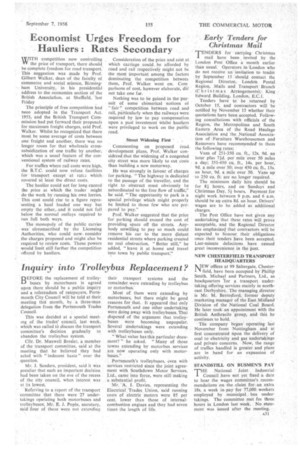Economist Urges Freedom for Hauliers : Rates Secondary
Page 33

If you've noticed an error in this article please click here to report it so we can fix it.
M1TH competition now controlling VV the price of transport, there should be complete freedom for road transport. This suggestion was made by Prof. Gilbert Walker, dean of the faculty of commerce and social science, Birmingham University, in his presidentIl address to the economics section of the British Association, at Sheffield, 'last Friday The principle of free competition had been adopted in the Transport Act. .1953, and the British Transport Commission had put forward their proposals for maximum freight charges, said Prof. Walker. Whilst he recognized that there most be some average of costs between one freight and another, there was no longer room for that wholesale crosssubsidization of one traffic by another, which was a usual feature of the conventional system of railway rates.
For traffics where rail costs were high, the B.T.C. could now refuse facilities for transport except at ratc3 which covered at least the direct costs.
The haulier could not for long exceed the price at which the trader might do the work by running his own lorries. This cost could rise to a figure representing a haul loaded one way but empty the other,-and it could not fall below the normal outlays required to run full both ways. The monopoly of the public carrier was circumscribed by the Licensing Authorities, who could now. consider the charges proposed and might also be required to review costs. Those powers -would limit still further the competition offered by hauliers. Consideration of the price and cost at which carriage could be afforded by road and rail respectivelY might not he the most important among the factors dominating the competition betweeb them, Prof. Walker went on. Com parisons of cost, however elaborate, did not take one far.
Nothing was to be gained in the pursuit of some chimerical notions ol "fair ?' competition between road and rail, particularly when the railways were required by law to pay compensation upon a past investment Whilst hauliers were privileged to work on the public road.
Street Widening First Commenting on proposed road._ development plans, Prof. Walker considered that the widening of a congested city street was more likely to cut costs than building a new motorway.
He was strongly in favour of charges for parking. "The highway is dedicated to the passage of the traveller, and the right to obstruct must obviously be subordinated to the free flow of traffic," he said. "The opportunity to park is a special privilege which might properly be limited to those few who arc prepared to pay."
Prof. Walker suggested that the price for parking should exceed the cost of providing space off the streets. Anybody unwilling to pay so much could remove his car to the more distant residential streets where parking created no real obstruction. "Better still," he added, "leave it at home and travel into town by public transport."








































































































